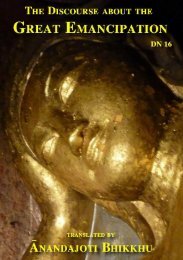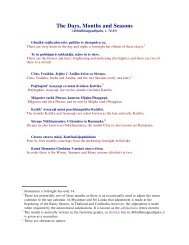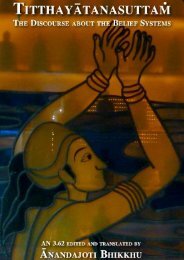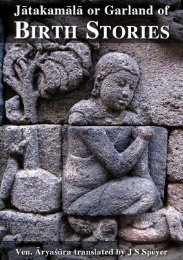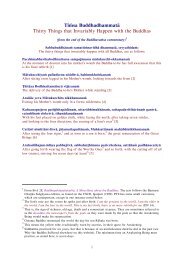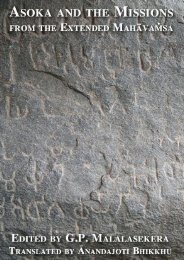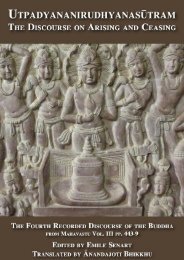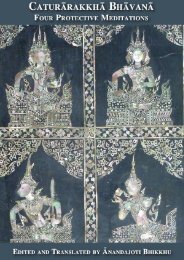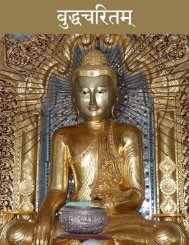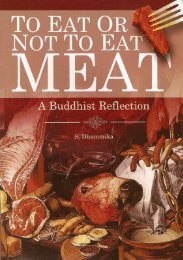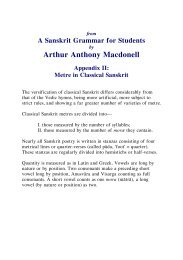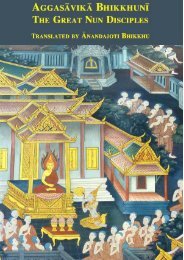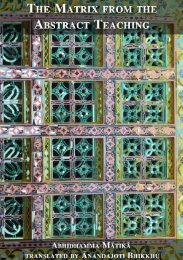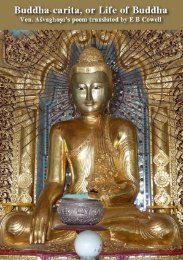MahÄkhandhako The Great Chapter - Ancient Buddhist Texts
MahÄkhandhako The Great Chapter - Ancient Buddhist Texts
MahÄkhandhako The Great Chapter - Ancient Buddhist Texts
Create successful ePaper yourself
Turn your PDF publications into a flip-book with our unique Google optimized e-Paper software.
<strong>The</strong> <strong>Great</strong> <strong>Chapter</strong> - 172<br />
Atha kho āyasmā Assaji Sāriputtassa paribbājakassa<br />
o <strong>The</strong>n the venerable Assaji recited this Dhamma instruction<br />
imaṁ Dhammapariyāyaṁ abhāsi:<br />
to the wanderer Sāriputta:<br />
“Ye dhammā hetuppabhavā tesaṁ hetuṁ Tathāgato āha,<br />
“Whatever things 213 have a cause and source, their cause the Realised One has<br />
told,<br />
Tesañ-ca yo nirodho - evaṁvādī Mahāsamaṇo.” ti<br />
And also that which is their cessation 214 - such is the <strong>Great</strong> Ascetic’s doctrine.”<br />
Atha kho Sāriputtassa paribbājakassa, imaṁ Dhammapariyāyaṁ sutvā,<br />
<strong>The</strong>n to the wanderer Sāriputta, after hearing this Dhamma instruction,<br />
virajaṁ vītamalaṁ Dhammacakkhuṁ udapādi:<br />
the dust-free, stainless Vision-of-the-Dhamma arose:<br />
“Yaṁ kiñci samudayadhammaṁ,<br />
“Whatever has the nature of arising,<br />
sabban-taṁ nirodhadhamman.”-ti<br />
all that has the nature of ceasing.”<br />
“Eseva Dhammŏ yadi tāvad-eva paccavyathā Padam-Asokaṁ,<br />
And he said: “This really is the Dhamma if you have penetrated the Sorrowless<br />
State,<br />
adiṭṭhaṁ abbhatītaṁ bahukehi kappanahutehī.” ti<br />
unseen through many myriads of past aeons.”<br />
Atha kho Sāriputto paribbājako yena Moggallāno paribbājako tenupasaṅkami.<br />
<strong>The</strong>n the wanderer Sāriputta approached the wanderer Moggallāna.<br />
Addasā kho Moggallāno paribbājako<br />
<strong>The</strong> wanderer Moggallāna saw<br />
Sāriputtaṁ paribbājakaṁ dūrato va āgacchantaṁ,<br />
the wanderer Sāriputta coming while still far away,<br />
213 Comm: pañcakkhandhā; the five constituents (of mind and matter making up a human<br />
being).<br />
214 Regarding this famous verse the commentary points out that the first line refers to the<br />
Truth of Suffering the second to the Arising of Suffering, and the third to the Cessation of<br />
Suffering.



